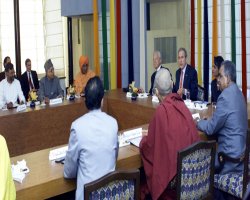
By Swami Agnivesh
The unity that under-girds the cultural and religious diversity in India has its roots in our Vaidic Sanatan Dharma. A vast majority of our people, cutting across: religious and cultural divides, believe in one God, the Creator of the whole universe. Insofar as we all have the same origin, we intuit a shared kinship that is deeper than our colours and creeds. Everyone without exception is a child of God. It was this profound intuition that enabled Jesus of Nazareth to present God as "our Father in Heaven". The practice of sticking religious labels on God was, thankfully, alien to India. The all-pervasive God, who transcended form, was understood, experienced and expressed in terms of the four universal attributes: love, compassion, truth and justice. God, not religion, has been the foundation for our unity and harmony. The mark of true godliness is that we are able to see the whole of creation as our shared home ie.Vasudhaive Kutumbakam,the whole world a family. Every hindrance to this, whether it be caste, creed, culture, race or wealth, is blasphemy. Diversity is God's gift to us, meant to enrich and stimulate. But it will remain a gift only if it is founded on true godliness.
Godliness, as Gandhiji, taught us cannot be confined to temples, churches and mosques. God as love, compassion, truth and justice is needed more in the market place than in the so-called sacred space. At any rate it is a far greater spiritual challenge to bring godliness into politics and economics than into religiosity. Our history is illumined by the rare example of a king -Emperor Ashoka- who applied godliness to governance. The bloodshed and mountainous misery of the battle of Kalinga activated the compassion of this great son of India who, for the rest of his reign, abjured violence. Mr. President, it is the demonic dogma of our times that the use of brute and overwhelming force is a must in the diplomacy and governance alike. The religions of world leaders vary, but they all subscribe in practice to the Creed of Chairman Mao Tse Tung that politics is war without bloodshed and war is politics with bloodshed. The most authentic expression of Indian spirituality is not to be sought and found, I believe, in our temples and priest-crafts but in our quest to integrate spirituality with politics.
That is why our idea and practice of secularism is radically different from its western model. For us, secularism is not the surgical separation of the Siamese twins of religion and politics, but their spiritual integration so that the culture of governance is nourished by eternal values. The encounter between our great nations, Mr. President, can be either an exercise in diplomacy or an enterprise in statesmanship. The fact that our countries share a background of religio-cultural diversity cannot, by itself, guarantee that Indo-US relationship can attain the stature of mature and enduring partnership. Partnership presupposes a shared agenda. What is that agenda? Maximizing bilateral benefits may be a significant goal in diplomacy. But if our partnership is to be statesman-like we need to look beyond ourselves. Re-phrasing the words of one of your predecessors, I wish to say: ask not what we can gain for ourselves. Ask what we together can do for our globalizing world. In a shrinking global village, Mr. President, we shall mistake our brothers and neighbors for our enemies if our hearts are not filled with love and compassion and our minds are not afire with a passion for truth and justice. The question that confronts all of us is whether we have the courage of conviction to do whatever it takes to turn our global village into a garden of justice and peace for all. Jesus, I am told, came to preach the Good News to the Poor. Godlessness is the ultimate poverty. The soul of India challenges you, Mr. President, to work tirelessly to create a God-centric world order in which those who practice various religions know themselves, first and foremost, as the children of God.
- Swami Agnivesh